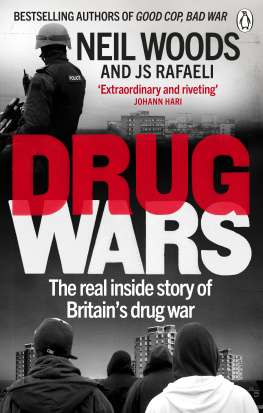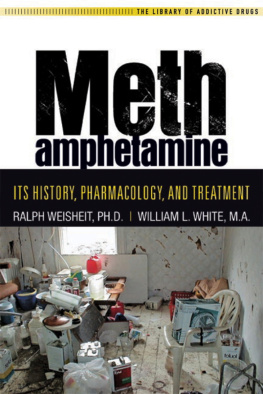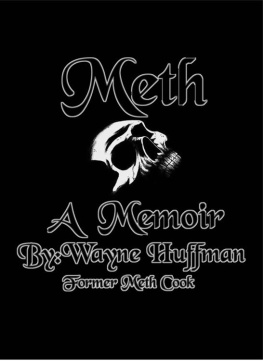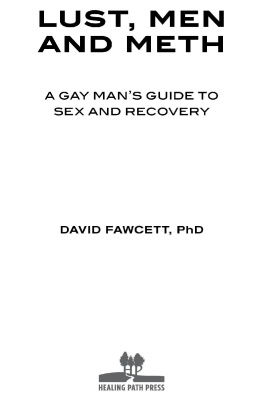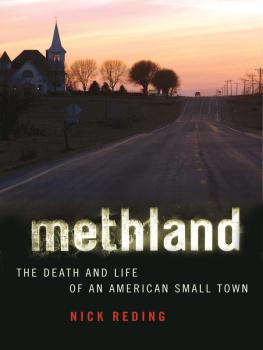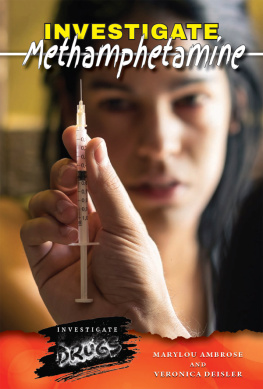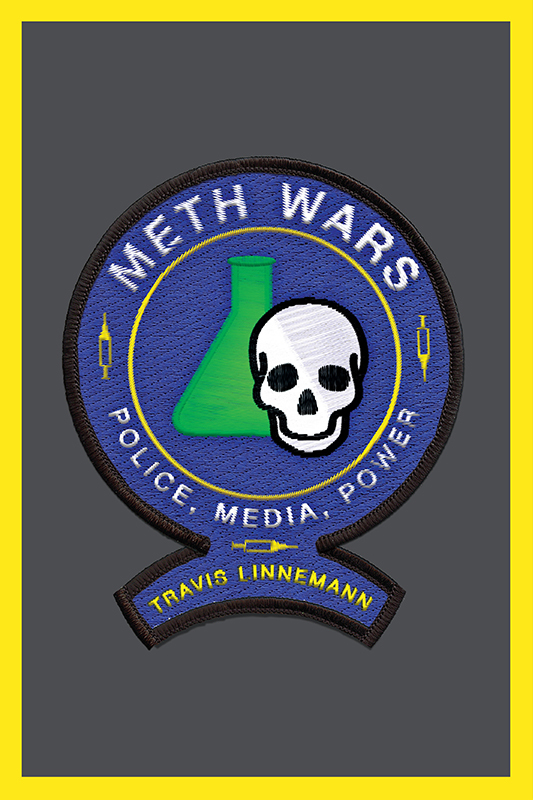
Meth Wars
Alternative Criminology Series
General Editor: Jeff Ferrell
Pissing on Demand: Workplace Drug Testing and the Rise of the Detox Industry
Ken Tunnell
Empire of Scrounge: Inside the Urban Underground of Dumpster Diving, Trash Picking, and Street Scavenging
Jeff Ferrell
Prison, Inc.: A Convict Exposes Life inside a Private Prison
by K. C. Carceral, edited by Thomas J. Bernard
The Terrorist Identity: Explaining the Terrorist Threat
Michael P. Arena and Bruce A. Arrigo
Terrorism as Crime: From Oklahoma City to Al-Qaeda and Beyond
Mark S. Hamm
Our Bodies, Our Crimes: The Policing of Womens Reproduction in America
Jeanne Flavin
Graffiti Lives: Beyond the Tag in New Yorks Urban Underground
Gregory J. Snyder
Crimes of Dissent: Civil Disobedience, Criminal Justice, and the Politics of Conscience
Jarret S. Lovell
The Culture of Punishment: Prison, Society, and Spectacle
Michelle Brown
Who You Claim: Performing Gang Identity in School and on the Streets
Robert Garot
5 Grams: Crack Cocaine, Rap Music, and the War on Drugs
Dimitri A. Bogazianos
Judging Addicts: Drug Courts and Coercion in the Justice System
Rebecca Tiger
Courting Kids: Inside an Experimental Youth Court
Carla J. Barrett
The Spectacular Few: Prisoner Radicalization and the Evolving Terrorist Threat
Mark S. Hamm
Comic Book Crime: Truth, Justice, and the American Way
Nickie D. Phillips and Staci Strobl
The Securitization of Society: Crime, Risk, and Social Order
Marc Schuilenburg
Covered in Ink: Tattoos, Women, and the Politics of the Body
Beverly Yuen Thompson
Narrative Criminology: Understanding Stories of Crime
Edited by Lois Presser and Sveinung Sandberg
Progressive Punishment: Job Loss, Jail Growth, and the Neoliberal Logic of Carceral Expansion
Judah Schept
Meth Wars: Police, Media, Power
Travis Linnemann
Meth Wars
Police, Media, Power
Travis Linnemann

NEW YORK UNIVERSITY PRESS
New York
NEW YORK UNIVERSITY PRESS
New York
www.nyupress.org
2016 by New York University
All rights reserved
References to Internet websites (URLs) were accurate at the time of writing. Neither the author nor New York University Press is responsible for URLs that may have expired or changed since the manuscript was prepared.
Library of Congress Cataloging-in-Publication Data
Names: Linnemann, Travis, author.
Title: Meth wars : police, media, power / Travis Linnemann.
Description: New York : New York University Press, [2016] | Series: Alternative criminology series | Includes bibliographical references and index.
Identifiers: LCCN 2016023893| ISBN 978-1-4798-7869-7 (cl : alk. paper) | ISBN 978-1-4798-0002-5 (pb : alk. paper)
Subjects: LCSH: Methamphetamine abuseSocial aspectsUnited States. | Methamphetamine abusePress coverageUnited States. | MinoritiesDrug useUnited States. | PoliceUnited States. | Drug controlUnited States.
Classification: LCC HV5822.A5 L56 2016 | DDC 362.29/950973dc23
LC record available at https://lccn.loc.gov/2016023893
New York University Press books are printed on acid-free paper, and their binding materials are chosen for strength and durability. We strive to use environmentally responsible suppliers and materials to the greatest extent possible in publishing our books.
Manufactured in the United States of America
10 9 8 7 6 5 4 3 2 1
Also available as an ebook
Contents
While it is my name alone on the cover, any work such as this is not a solitary but a collective effort. As such, any attempt to compile a full account of those who have helped along the way would invariably fall short. Perhaps, then, it is best to think of this as the first draft of a heartfelt thank you, to all those who have contributed to and supported my work. Meth Wars is the product of research and writing that stretched across seven years, three universities, and as many states. The book would certainly not have been realized if not for L. Susan Williams, whose support and encouragement gave me an initial foothold from which to begin my academic career. Thank you, Sue. Likewise, I would like to recognize Spencer Wood for his tireless commitment to his students. Thank you, Spence. I cannot begin to express my gratitude to university staff, particularly Karen Rundquist, Amy Eades, Tina Clark, and Stacy Groce. Thank you, all. To my first academic family at Old Dominion University, Allison Chappell, Mona Danner, Randy Gainey, Scott Maggard, Randy Myers, Dawn Rothe, Ruth Triplett, and Jeff Toussaint, your abiding warmth, humor, and friendship means more than you know. For continued intellectual and personal support, I thank my old friends and new colleagues, Avi Brisman, Victoria Collins, Kishonna Gray, Vic Kappeler, Pete Kraska, Gary Potter, Judah Schept, and Kenneth Tunnell at Eastern Kentucky University. For intellectual influence and for helping to create space for younger scholars such as myself, I thank Michelle Brown, Eamonn Carrabine, Jeff Ferrell, Simon Hallsworth, Mark Hamm, Keith Hayward, Yvonne Jewkes, and Majid Yar. I am grateful to Ilene Kalish, Caeyln Cobb, Dorothea Halliday, Andrew Katz, and the staff at NYU Press for their unparalleled professionalism and support. Many thanks to Bill McClanahan for his willingness to read and comment on drafts and for important contributions to my understanding of rural culture. I thank my good friends Don Kurtz and Laura Hanson for their contributions to the book and for years of humor and friendship. A special thanks is due Tyler Wall, whose contributions here are crucial and many. Lastly, I would like to thank Judy Linnemann, and Jessica Jones, for their unwavering love and support and for listening patiently as I have droned on about this project for years.
The Methamphetamine Imaginary
You are normal. Its the speed that made you a freak.
Jerry Stahl, Bad
February 2014: According to local news broadcasts, the Benson family of Union County, Illinois, got the scare of their lives when drug agents raided their home expecting to find a methamphetamine lab. Laura Benson described the scene and her surprise, explaining, I heard the dogs barking. And I knew that meant somebody was outside the house. And I looked out the windows and I seen a truck coming up the driveway fairly fast. And an Anna police car right behind it. Apparently a few blue plastic barrels and tubing near some of the trees on the property had led one of the Bensons neighbors to alert police. I think my neighbors on their way to church see the buckets and stuff and think weve got a meth lab operation going on here, Benson explained. Much to the chagrin of the drug agents, the barrels and tubing had nothing to do with methamphetamine and instead were used by the Bensons to collect tree sap to make maple syrup. They [the police] pointed to the buckets and I told them my husband has a hobby of making maple syrup. Of course they realized it once they seen it, Benson explained. But I was quite startled this morning.
A few months later and several hundred miles away, another misguided raid driven by the anxious desire to police methamphetamine unfolded. This time, a nineteen-month-old boy was permanently disfigured and nearly killed by a flash-bang stun grenade carelessly tossed into his crib by a member of the Habersham County (Georgia) Sheriff Departments Special Response Team. Earlier, a confidential informant sent to the home by police had purchased approximately fifty dollars worth of methamphetamine from one of its residents, Wanis Thonetheva. Neither these cases nor the hundreds similar, however absurd or tragic, should be dismissed as simply the unfortunate outcome of corruption or as human error or even regarded as all that unusual. Rather, all emerge from a shared political and cultural history stretching back decades, leading to a present in which police, politicians, and well-meaning neighbors see the risks and dangers of drugs like methamphetamine everywhere.
Next page


